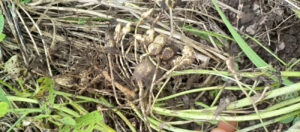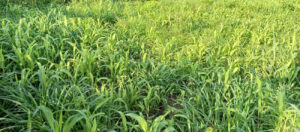Hunger offering aids Sierra Leone economic development
Sixty families in rural northern Sierra Leone are reaping the benefits of a new cash crop, thanks to a ministry led by a Baylor University graduate and supported by the Texas Baptist Hunger Offering.

The families in the Tonko Limbo Chiefdom of Sierra Leone’s Kambia District are involved in a pilot project launched by Agraverse, an agricultural economic development program founded by Paul Conteh.
“We currently are working in one village. By next year, we hope to involve at least three of the nine villages in Tonko Limbo Chiefdom,” Conteh said.
The families—who traditionally were subsistence farmers, growing just enough food for household consumption—are harvesting peanuts as a cash crop.
Peanuts were selected for the pilot project because their value in Sierra Leone has “increased drastically” in the past year, and the soil in Tonko Limbo Chiefdom is particularly “welcoming” for peanut production, Conteh noted.
“The hunger offering gave us the funds for us to purchase seeds,” Conteh said, adding the offering also helped with logistics.
Agraverse focuses on working with families rather than individuals.
“We don’t want our intervention to disturb or distort the unique family bonds in the communities,” he explained.
Putting community development principles to work
Agraverse applies principles of community development Conteh learned as a Master of Social Work student at Baylor University’s Diana R. Garland School of Social Work.
While attending the Evangelical College of Theology in Sierra Leone, Conteh became acquainted with Restore Hope, an international ministry directed by Cindy Wiles of First Baptist Church in Arlington.
From Restore Hope personnel, he learned about Baylor University and its School of Social Work. Conteh said he recognized the graduate program at Baylor would help him develop the “skills, knowledge and networks” that would enable him to return to Sierra Leone where he could minister to his own people.
“I got back home during the time when the Ebola crisis was almost coming to an end,” he recalled. “So, I was actively involved in the post-Ebola recovery process.”
Conteh worked with Restore Hope in Sierra Leone and then with the Princess Promise Foundation, a McKinney-based organization that offers Christ-centered care for vulnerable girls in Sierra Leone, before he founded Agraverse.

“During my time with Restore Hope, I also was teaching a course at the University of Sierra Leone on social research,” Conteh said. “These two platforms gave me the opportunity to spend more time in rural Sierra Leone. I was quite amazed at the vast unused land in terms of agricultural productivity.”
About 75 percent of arable land in Sierra Leone remains uncultivated, and the country imports the vast majority of the food it consumes.
Conteh began talking with people in farming communities to learn more about why so much fertile land was not being used to its full potential.
He discovered the villagers knew plenty about farming, but they needed help in economic development—marketing and selling their crops in other parts of the country.
“The irony is that they are educating us,” he said. “We went in with a learning mentality.”
Families in the area had been farming for generations, and they already knew the best techniques for growing crops on the available land. They needed help in obtaining seeds and then in transporting and marketing what they grew to other parts of the country, he explained.
Economically and environmentally sustainable
Agraverse emphasizes both economically sustainable and environmentally sustainable models.
“It’s 100 percent organic farming,” he said.
An economic development model that emphasizes cash crops to provide family income offers an attractive alternative to villagers who otherwise might engage in illegal logging, he noted.
As Agraverse began the pilot project in Tonko Limbo Chiefdom, Conteh soon determined the necessity of working not only with Baptists, but also other evangelical Christians in the area. The pilot program works in partnership with Baptist, Wesleyan and United Methodist churches.
“We went in with the mindset saying: ‘It’s OK. Let’s unify the body of Christ for the good of the community,’” he said. “We are at least breaking down some denominational lines.”
Agraverse relied on local churches to recommend specific families to participate in the pilot project.
Local churches, community leaders and program participants have exercised “creative freedom” in regard to how they shaped the program to make it their own, with limited intervention from Agraverse, Conteh noted.
Food and farming as a mission vehicle
While the region is predominantly Muslim, along with some Christians and a few traditional Animists, Agraverse received no resistance, he noted.
“We communicated our faith clearly,” Conteh said. “It was not a problem for us to practice our faith in the meetings and help recipients understand these gifts were given by the body of Christ.”
Conteh described the initial harvest as “bountiful,” and he looks forward to expanding the project next year not only to include additional villages, but also to experiment with other crops.
He also hopes to continue his own education. At some point, he hopes to return to Baylor to enroll in Truett Theological Seminary’s Master of Arts in Theology, Ecology and Food Justice degree program.
“I want to ensure I have the tools, knowledge and skillset to pour into these farmers,” Conteh said.
He wants to lead Agraverse not only to improve the economic conditions of farm families and allow them to grow quality crops that compete in the national market, but also be able to equip churches in Sierra Leone for ministries focused on agricultural and economic development.
“I want to see Agraverse teaching churches how to use food and farming as a mission vehicle,” he said. “Above all, I want Agraverse to help bring people to the saving grace of Christ Jesus.”